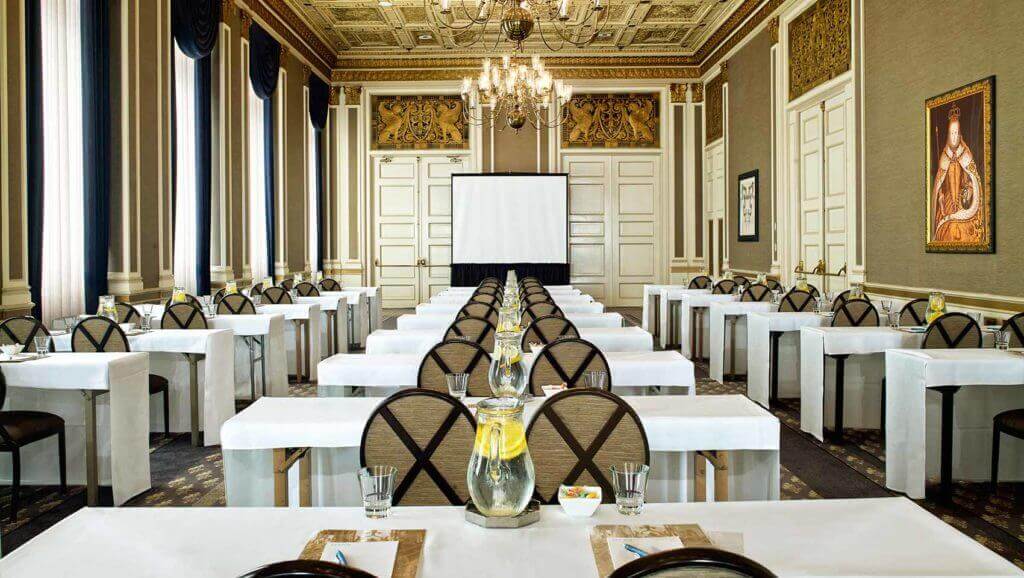
If you’re a hotelier looking to boost profits from your venue spaces, look no further than your data.
NB: This is an article from iVvy
In this day and age, data is one of the most powerful revenue-boosting tools at your disposal. When used strategically, your data can unlock hidden opportunities and make more informed decisions for budgeting, cost optimisation, marketing, and forecasting – all aspects of which determine the value and profitability of your venue space.
Subscribe to our weekly newsletter and stay up to date
To help you get started, here are the most important data metrics you need to be collecting, along with actionable tips to implement a successful data analytics strategy that can boost both profits and performance.
Key Data Metrics for Your Hotel Venue Space
To boost your hotel’s venue space revenue, you need to be considering the basic elements of time, profits, and the overall customer experience. The more you know when and how your venue spaces are being used, the more effectively you can budget, forecast, and market.
Essential data metrics to be collected and analyzed include:
- Venue Occupancy Rate: Identify peak and off-peak periods by measuring the utilization of venue spaces, such as the percentage of time they are booked or occupied. This allows for better pricing and promotional strategies, ensuring a steady cash flow throughout the year.
- Average Revenue per Event: Calculating the average revenue generated from each event or booking in your venue spaces provides a greater understanding of the profitability of events held within your venue space. This can assist in determining appropriate pricing strategies.
- Conversion Rate: Tracking your venue’s lead-to-booking conversion rate will assist in assessing the effectiveness of sales and marketing efforts, helping to identify areas for improvement, and optimizing the entire lead management process.
- Lead Time: Monitoring lead time (the duration between initial enquiry and booking date) helps to understand booking patterns, enabling hoteliers to optimize pricing, marketing campaigns, and resource allocation based on different lead time segments.
- Customer Satisfaction Scores: Collecting and analysing customer satisfaction scores via post-event surveys can provide insights into the overall event experience and improve the likelihood of repeat bookings or referrals. Positive customer experiences also contribute to long-term revenue growth.
- Repeat Bookings and Referrals: Tracking repeat bookings and referrals is a key metric for assessing customer loyalty and the success of your venue spaces. High repeat booking rates and referrals indicate customer satisfaction and the potential for increased revenue through word-of-mouth marketing.
Data Analytics Strategies to Optimize Venue Revenue
These techniques provide valuable insights that can drive informed decision-making and strategic actions for your hotel’s venue space:
1. Demand forecasting and pricing optimisation
- Using historical data for accurate demand predictions:
By analysing historical booking data, seasonal trends, and other relevant factors, hotels can forecast demand for their venue spaces more accurately. This helps in optimizing pricing strategies based on expected demand fluctuations. - Dynamic pricing strategies to maximize revenue: Data analytics enables the implementation of dynamic pricing models that adjust rates based on real-time factors such as occupancy rates, competitor pricing, and market demand. This ensures that prices are optimized to capture maximum revenue potential.
2. Customer segmentation and personalisation
- Analysing customer data for targeted marketing and upselling: By analysing customer demographics, preferences, past behavior, and interactions, hotel venues can segment their customer base. This segmentation allows for targeted marketing campaigns and personalised offers that resonate with specific customer segments, leading to increased revenue.
- Customizing guest experiences to drive loyalty and repeat bookings: Data analytics helps to understand guest preferences and behaviors, enabling hotel venues to tailor their services and experiences. Personalized recommendations, tailored amenities, and special promotions based on customer data can enhance guest satisfaction and loyalty, resulting in repeat bookings and increased revenue.
3. Competitive analysis and benchmarking
- Leveraging data to gain insights into competitors’ pricing and strategies: By analyzing competitor data, hotel venues can gain valuable insights into their pricing strategies, promotional activities, and value propositions. This information allows venues to make data-informed decisions on pricing adjustments and differentiation strategies to stay competitive.
- Identifying opportunities and differentiating your hotel venue:
Data analytics can help identify market gaps and customer needs that competitors may not be effectively addressed. By understanding customer preferences and market trends, hotels can develop unique venue offerings, packages, or services that differentiate their brand and attract more revenue.
4. Marketing campaign effectiveness
- Tracking and analysing marketing campaign data to assess ROI: Data analytics allows hotel venues to measure the effectiveness of their marketing campaigns by monitoring key metrics such as click-through rates, conversions, and revenue generated. By analyzing campaign data, venues can identify which strategies and channels are driving the highest return on investment (ROI) and optimize their marketing spend accordingly.
- Adjusting marketing strategies based on data-driven insights: Through data analytics, hotels can gain insights into venue client engagement patterns, preferences, and response rates. These insights help in refining marketing strategies, targeting the right audience segments, and delivering relevant messaging, ultimately increasing the effectiveness of marketing efforts and revenue generation.
- Streamlined proposal and contract templates across multiple hotels and brands
- Greater marketing promotion of special offers and packages
- More efficient database management, with a full view of all customer interactions
- A better understanding of business performance with detailed reporting, including enquiry lead time, length of conversion, booking patterns, marketing campaigns, and forecasting
Dive Into Your Data for Greater Venue Revenue
With the potential to unlock new opportunities, delight guests, and maximize profits, data analytics is a valuable tool that no hotel can afford to ignore. So don’t wait any longer – start exploring data analytics today and take your hotel’s revenue to the next level.



